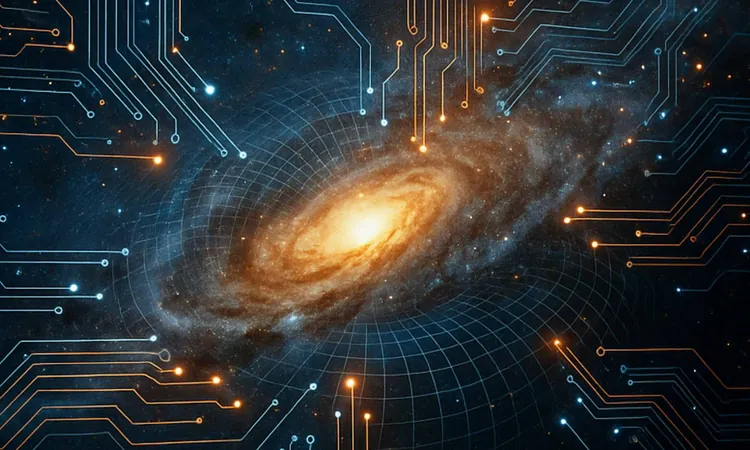
Is Gravity the Key to Unlocking the Secrets of a Computerized Universe?
2025-05-08
Author: Ken Lee
Imagine a universe that operates like one colossal computer. While this might sound like a plot twist from a sci-fi movie, cutting-edge theories suggest it could be closer to reality than we think. The idea that everything around us—planets, stars, even us—might be digitally encoded is sparking intense curiosity among scientists.
The Gravity-Information Connection
Renowned physicist Melvin M. Vopson from the University of Portsmouth proposes that gravity might be more than just a force; it could be a key signal in a vast, universal information system. His research hints that gravity contains information about the fundamental structure of the universe, potentially revealing it as an intricate web of data.
Is Space Just a Data Grid?
Recent investigations suggest that gravity could emerge not from traditional physics but from principles of data organization. Picture space as a complex information grid, where bits of matter are arranged akin to pixels in a digital image. This radical notion challenges the long-held belief that space is smooth and continuous, suggesting instead that it consists of discrete units.
The Infodynamics Framework
Enter 'infodynamics'—a concept proposing a link between the behavior of matter and informational processes. Vopson’s work raises the intriguing possibility that gravity is nature’s method for optimizing and storing information. When massive objects group together, they simplify the information the universe needs to process, leading to the fundamental attraction we call gravity.
Cosmic Puzzles and New Insights
If gravity does serve as an informational framework, we might unlock answers to some of the universe's greatest mysteries, including dark matter and dark energy. This theory offers fresh interpretations that could reshape how we perceive these elusive phenomena.
Challenges to Conventional Theories
It’s essential to clarify that Vopson’s theory does not outright replace existing models like general relativity or quantum mechanics. Instead, it presents a competing vision. The scientific community is left wondering: can these different frameworks coexist, or will one emerge victorious?
Testing the Waters of This Cosmic Theory
A significant hurdle lies in testing this theory. If the universe is akin to a computer, how can we uncover its 'source code'? Currently, no definitive experiments can confirm or refute this idea. Furthermore, even if gravity is a data-saving function, that doesn’t automatically mean we live in a simulation; it suggests a deeper role for information in the fabric of reality.
The Bigger Picture: Why It Matters
For the average person, the implications of gravity as an information construct may seem abstract. After all, apples will still fall, and planes will still fly. However, the shift in understanding the 'why' behind these occurrences could guide future technological innovations and problem-solving strategies across various fields, from physics to biology.
Published in AIP Advances, Vopson’s theory hints at a profound evolution in our scientific narrative, enticing us to ponder whether we inhabit an information-rich universe or simply a clever trick of nature. The conversation is just beginning!

 Brasil (PT)
Brasil (PT)
 Canada (EN)
Canada (EN)
 Chile (ES)
Chile (ES)
 Česko (CS)
Česko (CS)
 대한민국 (KO)
대한민국 (KO)
 España (ES)
España (ES)
 France (FR)
France (FR)
 Hong Kong (EN)
Hong Kong (EN)
 Italia (IT)
Italia (IT)
 日本 (JA)
日本 (JA)
 Magyarország (HU)
Magyarország (HU)
 Norge (NO)
Norge (NO)
 Polska (PL)
Polska (PL)
 Schweiz (DE)
Schweiz (DE)
 Singapore (EN)
Singapore (EN)
 Sverige (SV)
Sverige (SV)
 Suomi (FI)
Suomi (FI)
 Türkiye (TR)
Türkiye (TR)
 الإمارات العربية المتحدة (AR)
الإمارات العربية المتحدة (AR)